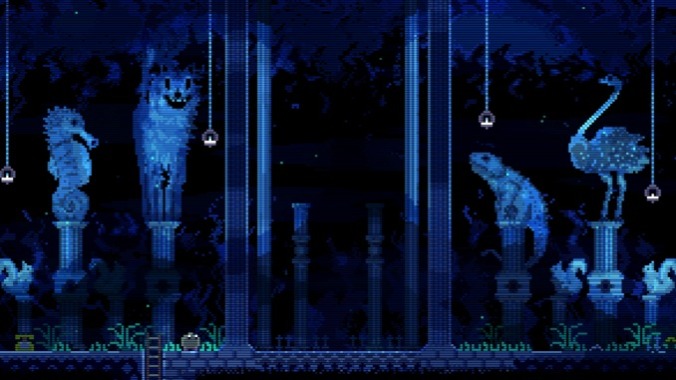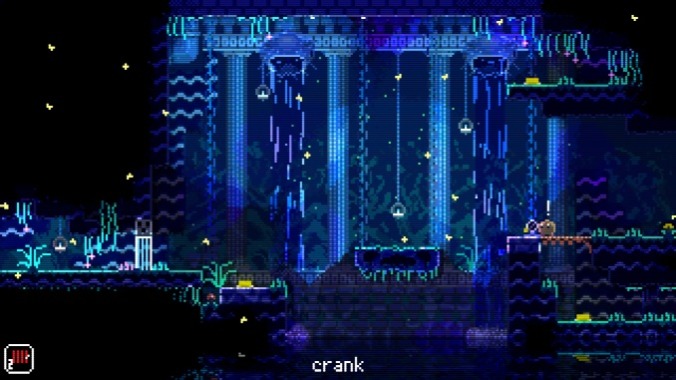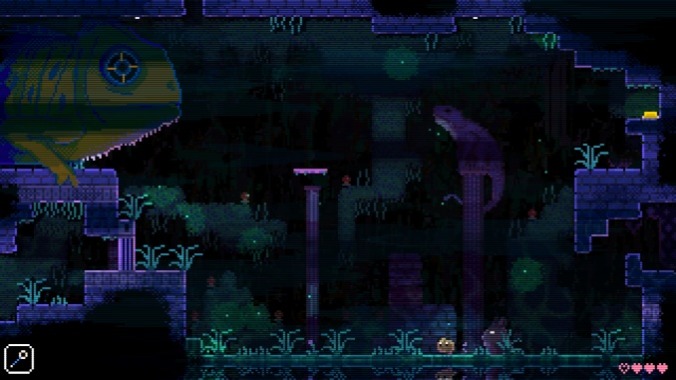Animal Well Is an Atmospheric Puzzle Platformer that Delights in Discovery
Games Reviews Animal Well
Sometimes, it feels like we can get a little too caught up on using genre as the end-all-be-all for describing games. At first glance, Animal Well, a game from solo dev Billy Basso, seems to fit into the same bucket as other Metroid-inspired romps: it’s a retro-tinged 2D platformer with a large overworld where you find items that encourage you to backtrack through areas you’d previously traversed. This overview is technically accurate but neglects to mention that thanks to its layers of well-considered mystery, this experience has more in common with the cryptic and rewarding puzzle-solving of Fez or Tunic than the action-packed adventures of Samus Aran.
Because instead of playing as a badass bounty hunter armed to the teeth with futuristic weaponry, you play as a goopy little ball incapable of taking out a lowly Geemer, let alone Mother Brain. Instead of improving your lethality, the tools you find along the way help you with solving puzzles, which range from quick and easy minor challenges, to world-spanning enigmas that will have you spiraling until you’re drawing up convoluted evidence board full of half-solved riddles. In short, this adventure isn’t about fights but about uncovering secrets, a dark wonderland full of strange locales and ego-inflating eureka moments that make for a deeply captivating journey.
Things begin as the protagonist, an unnamed orb with shoes, wakes up (or is born?) from a bulb. There is no explicit explanation for what to do next, and there isn’t exposition or dialogue to set the stage for who they are and what they want. Instead, you simply start poking around, solving simple platforming puzzles involving glowing yellow buttons as you encounter strange sights that won’t fully click into place until hours and hours down the line. The map is open from the beginning, with the only impediments to your progress being the absence of specific tools or knowledge. However, even compared to many other games in this style, things are quite open from the jump, with multiple directions to explore that grant a satisfying degree of freedom.

The puzzles you encounter while exploring come in layers, with the first being made up of relatively straightforward single-screen challenges that usually require some light platforming. Additionally, you’ll frequently find hidden pathways that lead to collectibles. These smaller trials, both the optional and mandatory ones, are fun and fill out the space, acting as a fitting complement to the exploration. It also helps that the platforming is quite snappy, especially when combined with later abilities that allow for clever traversal.
However, where things inspired a deeper curiosity, and at least in my case, an all-consuming obsession with unraveling these mysteries, was how these smaller puzzles tied into much bigger ones. In many areas, you’ll find landmarks that feel like they have a greater meaning, and they frequently do. I found myself jotting down notes and cataloging strange sights like an amateur archeologist way out of their depth until, eventually, these signs and ciphers began to make sense. The scope of these riddles and the lack of direct guidance made cracking them immensely satisfying, and the clues strike a good balance between being too obscure and too obvious.
While the game doesn’t teach you with explicit instruction, it does subtly craft scenarios that naturally lead to incredible discoveries, many of which had me literally yelling out loud as I finally solved some longstanding problem. Much of the trickier stuff is “optional,” in the sense that you can get to the credits without engaging with it, but even the mainline material comes with plenty of moments that make you feel like a detective or researcher who finally lands on a monumental find. Thanks to its open-ended qualities and absence of direct guidance, it all builds toward a few of the most gratifying revelations I’ve experienced in a game in recent memory.
And while things start simple before you’ve gotten to these more beguiling puzzles and grand realizations, this space invites exploration from the jump thanks to its entrancing atmosphere. This subterranean maze is a curious place, full of ancient, abandoned architecture and creatures that range from benign to sinister. The vivid purple and greens of the pixel art alongside the scanlines make the visuals pop, but what fully sells the mood is the soundscape. Splashing water and the crackle of fireworks reverberate through these winding caverns, further capturing that you’re in a vast enclosed habitat full of hidden alcoves.
While the soundtrack is often subdued, it makes itself known when needed, with chiptunes that glide in to dreamily accentuate a scenic backdrop or that kick into anxiety-provoking swings during encounters with creatures that want to tear you to pieces. The audiovisual landscape communicates that this is a multifaceted place, sometimes beautiful and at others deeply unsettlingly, allowing this experience to waver between these tones at a moment’s notice.

Although I wouldn’t classify Animal Well as a horror game, it successfully weaponizes the fact that you play as an ineffectual little guy who can’t defend themselves by having you run into wild creatures who don’t take kindly to your exploration. You’ll encounter animals like dogs whose synthesized barks and eagerness to rip you to shreds make them an absolute menace (no, you can’t pet the dog) or a certain hopping marsupial that jump-scared me into another dimension. Most frightening of all are unnerving foes who chase you down from screen to screen, channeling the pixelated dread of early videogame pursuers like Sinistar or that damn sun from Super Mario Bros. 3.
If I have one real misgiving with the experience, it’s that after the credits rolled, my mania around getting to the bottom of the deeper, optional mysteries made me a little too familiar with this space. Many of these enchanting backdrops became less novel after scouring the map pixel by pixel to get at collectibles that gated further discoveries, especially when I found increasingly dwindling rewards on each comb through these areas. When I became stuck with one more collectible left to go, I very much wished there was some sort of hint system that could nudge you in the right direction to save you from scouring the entire map for the tiniest of visual clues. That said, it says a lot in the game’s favor that I became sucked in enough for this to be a problem, and the journey still feels fulfilling even if you opt to skip these late-game challenges.
Overall, you’ve probably seen many of Animal Well’s components in isolation before. Its structure is at least partially inspired by games like Metroid, its style of puzzles bear a lot of resemblance to Fez, and its retro aesthetics call to mind a whole host of older games and contemporary works. But the way these parts come together is nothing short of uniquely enrapturing. Its smaller puzzles are rewarding, and its larger ones are so satisfying that things can quickly spiral into outright obsession, something made more captivating by this well-realized setting that is charming and disquieting in equal measure. At its core, Animal Well profoundly understands how to encourage and pay off curiosity, which is probably why, even after digging into and solving many of its mysteries, I still need to know just how much deeper this rabbit hole goes.
Animal Well was developed by Billy Basso / Shared Memory and published by Bigmode. Our review is based on the PC version. It’s also available for the PlayStation 5 and Switch.
Elijah Gonzalez is an assistant Games and TV Editor for Paste Magazine. In addition to playing and watching the latest on the small screen, he also loves film, creating large lists of media he’ll probably never actually get to, and dreaming of the day he finally gets through all the Like a Dragon games. You can follow him on Twitter @eli_gonzalez11.